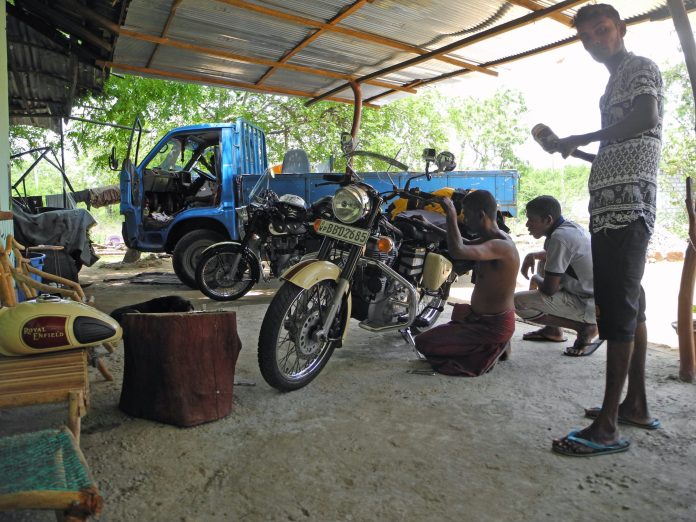I hate to write “I’ve been there and done that,” but I kind of have. So here are a few hints that other RTW riders may not give you.
***
Let us say that you suffer a mechanical failure of some kind while anywhere in the world, especially but not only the Third World. I suggest you do not make your way to an authorized agent of your brand of motorcycle. Authorized agents are a poor choice for repairs—for four reasons.
First, they will want to (and are often required to) fix your problem ‘properly’. This means that on an airhead BMW, for example, they will want to replace that broken rear subframe. This is no guarantee that the problem will not recur. Indeed, it is almost a guarantee that it will, and you will have to find another BMW agent. A village blacksmith, on the other hand, will weld up the offending break and add a couple of supporting struts which will still be functional when the hipster you’ve sold the bike to after returning home tries to “customize” it. If your artisan friend does need spare parts, he will get them from the agent for half the money you would pay, and will not add a margin if he thinks you are a good guy.
Ideally, you will be able to fix problems yourself. But I’ve tried re-spoking a wheel road-side, and it’s no fun. Photo: The Bear
Second, it will cost you. There’s the hourly rate of the mechanic, the overheads, and finally the cost of the new part. Oh, I forgot amortization of equipment. Consider the time I had to have the side stand on my Honda XL250 repaired, somewhere in the Corn Belt of the USA. A Honda dealer would have fitted a new stand, I’m pretty sure. The garage mechanic I found in a small town welded it up for me and did not want to charge me at all because it was such a small job.
Third, the repair/replacement will take a long time. This may well mean that you’ll find yourself stranded in some decaying industrial pit of a town, paying good money for a dump of a hotel. That’s especially annoying when your visa is running out or your plans are otherwise derailed. Your blacksmith, on the other hand, will take a look at the problem, scratch his beard and do the job on the spot, or at least before dinner.
Fourth, you have no guarantee that the problem will be fixed ‘properly’. Even if there is a Suzuki sign hanging on the front of the shop, the mechanic who does your work may never have seen an example of your DR650 or indeed any motorcycle before. In the Third World, he is more likely to have worked on small engines installed in agricultural equipment. But even if he has training in the kind of trouble with which you have presented him, he may simply screw up. And you can’t watch him work, because it’s a ‘proper’ workshop. The local artisan, on the other hands, will have no objection to your stickybeaking because that way you can hand him his tools.

Local mechanics will be happy to let you watch them work. Photo; The Bear
In the seven months and many thousands of kilometers that my borrowed Yamaha XS1100 carried Mrs Bear-to-be and me through France, Spain and Portugal; Morocco, Algeria and Tunisia; Italy, Yugoslavia, Greece, Turkey and several countries of the old Eastern Bloc as well as Germany and England, I had exactly one problem with it.
It was raining heavily as we rolled into Slunj and the bike began running on three cylinders. A sodden inspection of the engine disclosed that one of the plug caps had not been securely snapped back into place – by the accredited Yamaha mechanic servicing it in Rome.
***
Here’s another thing. Who doesn’t like a drink around the campfire after a long day’s ride? And even if you don’t, it’s the soul of hospitality to offer your fellow fire-gazers a libation. A drink, however, is not necessarily a drink. If you carry spirits you have no problem, although it may be considerate to also provide a mixer. Straight spirits can challenge anyone who is not used to them.
Note, though, that in countries which have an ambiguous attitude to alcohol, spirits are often weaker than the stuff you’ll be used to from home. Turkish raki, for instance, can have as little as 20 per cent alcohol. On the other hand, Australia offers overproof rum which contains about 50% more alcohol than most other spirits—it is roughly 120 proof.

Somewhere out in the Corn Belt, a local mechanic welds up the XL’s side stand. Photo: The Bear
Fortified wines like sherry or port are more easily tolerated, but keep in mind that they are often quite sweet. That is not to everyone’s taste. Beer is an easy option, but buy cans if you, er, can. Remember that beer is subject to light strike, especially if it’s a craft brew, and carrying bottles around may expose the contents to too much sun. Cans also chill more quickly. Generally speaking, any unfortified alcoholic beverage is best if its temperature does not change too often.
Wine drinkers have it easy. Just about any bottle of white or rosé, also chilled, will cheer the company. Once again, keep in mind that a lot of white wines and some rosés are sweet, too. It’s a bit tougher with red wines. Although you can, at least, drink them warm, the jouncing and vibration to which the wine will be exposed is anathema to good reds. Taking one of those camping is a waste of money. Your best bet is to buy a relatively cheap bottle and just stand it out of the way once you arrive at camp, to let it settle a bit.

There are many different beers in the world, and they all deserve respect. Photo: The Bear
Traveling in France, I have found that the cheap vin ordinaire – often unlabelled – is actually better than more expensive drops in the lower price brackets. Remember that the French buy this wine in vast quantities, usually to drink with meals, and anything the French drink is good enough for me. Well, I can have too much pastis.
In Italy, the way to buy your wine is in bulk. We carried a five-liter container which we refilled at regular intervals. Being carried around in plastic, suffering the inevitable vibration and shaking as well as being warmed by the sun seemed to do no harm to reds. One of my friends said that this was because the wine was so bad it could not get worse, but he drank it. And there is far worse wine, such as the Algerian ‘vintages’ transported in 44 (55 in the US) gallon drums.
Good riding to you, and just enough trouble to make the trip interesting when you recount it at home.













